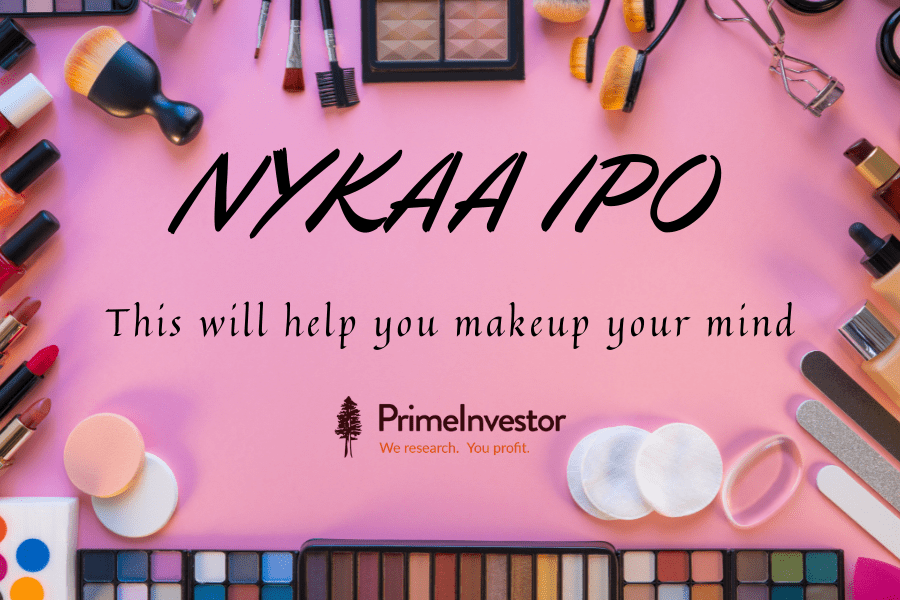FSN E-commerce Ventures, which operates e-commerce platforms in the beauty and fashion spaces under the brand name Nykaa, is launching a Rs 5,350 crore IPO that comprises a fresh issue of shares of Rs 630 crore and an offer for sale of Rs 4,720 crore.
The book-built offer is being made in a price band of Rs 1,085 – Rs 1,125. The offer opens today and closes on November 1 2021. The bid lot is 12 shares.

Use of proceeds
A large part of this IPO is made up of the offer for sale which puts 4.19 crore shares on the block from the Sanjay Nayyar Family Trust, TPG group, LightHouse India Funds and others. The IPO will result in only minor equity dilution by the promoters, with the pre- and post-offer shareholding looking as follows.
Of the fresh issue proceeds, Rs 156 crore will be used to repay borrowings, Rs 234 crore will be spent on customer acquisition costs, while Rs 42 crore each will be deployed in setting up new physical stores and warehouses to enhance fulfilment, helping Nykaa’s presence in Tier 2/3 cities.
Business
FSN e-commerce Ventures (referred to as Nykaa in this analysis) sells beauty and personal care products, apparel and accessories through two major online platforms – Nykaa and Nykaa Fashion. While the business is structured as a holding company with several subsidiaries, it essentially comprises two main verticals – Beauty and Personal Care (BPC) and Fashion.
As the first mover to set up an e-commerce platform focused on BPC products way back in 2012, Nykaa has emerged the undisputed leader in this space. While online purchases account for just 8% of the Indian consumers’ BPC purchases, Nykaa is estimated to hold a 30-35% share of such purchases. In the fashion business, where online penetration is higher at about 12%, Nykaa’s platform holds an estimated 2% market share.
It is the BPC business that currently chips in with the lion’s share of Nykaa’s Gross Merchandise Value (GMV), revenues and EBIDTA, and thus decides its valuation. Of Nykaa’s GMV of Rs 4045 crore in FY21, BPC accounted for Rs 3380 crore (83.5%) and Fashion for Rs 665 crore (16.5%).
The online channel is Nykaa’s main money-spinner, with 55.8 million app downloads and 88% of its GMV originating from its apps. Nykaa’s BPC platform today offers 2644 brands across 2.56 lakh SKUs, straddling price points that range from sub-Rs 100 products to international luxury brands. The fashion platform offers 1434 brands across 2.8 million SKUs.
Nykaa supplements its online presence through 80 physical retail outlets which not only help customers touch-and-feel products but also help with wider reach and order fulfilment. It has also been nurturing a private label business with 15 brands, which presently make up sub-8% of sales.
Nykaa has recorded impressive growth across its BPC customer acquisition and transaction metrics between FY19 and now. The table below captures its progress.
If we ignore quarterly blips due to Covid-induced aberrations, Nykaa has managed a 33% CAGR in the number of visits, 69% CAGR in unique transacting customers, 31% CAGR in order flows, and about 10 % CAGR in its average order value (AOV) in BPC between FY19 and FY22 - annualizing April-August numbers. Growth in the nascent fashion business has been even better, but it is early days to extrapolate it given that the space is extremely competitive and that Nykaa’s share in it is minuscule.
Business positives
#1 Solving a consumer problem
For investors keen to cash in on the business opportunity arising from India’s young, upwardly mobile consumers, a vertical online retailer playing on BPC is an excellent bet. BPC is the only sub-segment within FMCGs which has been growing in the double digits in recent years (12-13% CAGR annually). It still features a large unorganized segment (about 70%), ripe for conversion to big-name brands.
While consumers in lower income strata and Tier2/3 towns actively aspire to buy national and international cosmetic brands, they’ve so far had limited access. BPC products sold through small outlets beyond metros are plagued by quality issues arising from fakes, knock-offs and expiry-dated products.
Nykaa solves this problem by offering a wide variety of national brands and even international brands on its platform, with a guarantee of authenticity provided by the manufacturer. Its discount plans, efficient management of expired products and return policy are also draws to women exploring online purchases for the first time. 64% of Nykaa’s revenues originate from Tier 2/3 cities and it has the ability to service 86% of the serviceable pincodes across the country.
In the fashion segment, which is mostly unorganized, the market opportunity is far larger. But given that the space has already been captured by deep-pocketed online retailers like Amazon and Myntra, breaking into it may not be easy for a late-mover like Nykaa.
A Red Seer study commissioned by Nykaa for the purpose of this IPO pegs the likely offline retail market size for BPC at nearly Rs 2 lakh crore, doubling from current levels and that for fashion at Rs 8.7 lakh crore by 2025. Online penetration levels in India for the two markets are at 8% and 12% respectively, well below developed market standards of 20-25%.
While e-commerce enthusiasts expect India to catch up with those penetration levels, using more conservative assumptions of India getting to online penetration of 15% on BPC and 20% on fashion by 2025, we think Nykaa could be facing a market opportunity of Rs 29,700 crore and Rs 1.74 lakh crore respectively in the two segments. Its current GMV in these segments is about Rs 4600 crore and Rs 1600 crore (based on annualized FY22 revenues), offering ample runway for growth.
#2 Clear revenue model and cost control
Unlike most other tech businesses which appear to be figuring out their revenue models and have no visibility on the path to profitability, Nykaa has both metrics clearly mapped.
On revenue streams, Nykaa relies on three sources:
- Gross margins on BPC inventory acquired from manufacturers and sold on its platform
- Advertising and marketing support fees paid by manufacturers for Nykaa to promote their brands
- Selling commissions offered by fashion brands to list on the Nykaa marketplace
For its core BPC business, Nykaa has thus far leveraged on an inventory-led model to scale. It enters into tie-ups with national and international beauty brands to source inventory at wholesale prices, holds it on its books and funds discounts out of the high gross margins that manufacturers allow it.
Apart from giving the company control over the quality and range of its BPC offering, this inventory-led model allows Nykaa to manage its costs well and aspire to unit profitability. In fashion, Nykaa is currently operating on the marketplace model with inventory held on sellers’ books, while Nykaa charges a commission for product listings.
With BPC being the mainstay thus far, Nykaa has displayed far more frugality than most of its platform peers in spending on customer acquisition and marketing costs, technology and fulfilment costs. In the last three years (excluding Covid impacted periods), Nykaa has spent roughly 11-12% of its revenues on advertising and marketing, 9% on fulfilment costs and 1-2% on technology. This has led to gross margins of about 40-41% and positive EBIDTA in each of the last three years, though the company made losses at the net level until Q1 FY22.
#3 Influencer and content ecosystem
Given the attractiveness of the online BPC space, Nykaa has been facing competitive threats from vertical as well horizontal e-commerce companies seeking to break in. It has so far managed to keep such competition at bay through its strong manufacturer relationships and its unique customer acquisition strategy that relies almost entirely on digital marketing, social media influencers and tie-ups with A-lister celebrities.
From the outset, Nykaa has drawn new users to its portal through differentiated and curated content that handholds the consumer through her choices. Its affiliate program consisting of 3,055 social media influencers, has been instrumental in Nykaa’s top-of-mind recall in BPC. Both brand tie-ups and influencer networks can be hard to replicate for new entrants.
The consumer preference for wide choice and a well-curated collection have helped Nykaa ward off competition from e-commerce horizontal giants such as Amazon as well as vertical challengers such as Purplle and MyGlamm which are at a fraction of Nykaa’s size. But BPC forays from established portals like Myntra can pose a material competitive threat to Nykaa and dislodge it from pole position.
Business negatives
#1 Fashion foray
Bullish business cases for most Indian ecommerce firms are made on the basis of the size of the market opportunity. While Nykaa has definitely proven its ability to win in the BPC space, it is on weaker ground in its fashion foray – the segment that it is now focusing on to drive GMV.
There are many basic differences between Indian shopping behaviour for BPC versus fashion products. In BPC, branded manufacturers such as HUL, P&G, L’Oreal, Maybelline and others have created considerable awareness about the wisdom of using branded products against unproven local products. In fashion, especially women’s apparel particularly ethnic wear, unbranded and unorganized retailers dominate. A small player like Nykaa may find quite an uphill task to educate the consumer on the benefits of upgrading to branded apparel.
Two, given the sheer size of market opportunity in the fashion space, deep-pocketed horizontal ecommerce players such as Amazon and Myntra have already acquired an entrenched presence. Offline retailing giants such as Aditya Birla (Ajio) and Tatas (Tata Cliq) are also breaking in. If Nykaa retains its conservative approach to marketing spends and customer acquisition, it is by no means a given that it will be able to gain a significant share of this space.
Three, concerted efforts to break into this space with higher ad costs and a marketplace model can alter Nykaa’s business profile materially, decimating its USP of being the rare profitable and frugal player in the e-commerce space.
#2 Promoter dominance
Most of Nykaa’s business choices and strategic moves since inception appear to have been driven by the promoter family. Post-IPO the promoter family will continue to occupy most key CXO positions - Falguni Nayar (Chairperson and MD), Sanjay Nayar (Non -Executive Director), Adwaita Nayar (ED and Chairperson of Nykaa Fashion), Anchit Nayar (Chairperson of Nykaa e-retail).
Whether the company has the professional management bandwidth to scale up and will take greater cognizance of the views and interests of public investors post-listing, needs to be seen. The promoter family took home remuneration amount to Rs 17.1 crore in FY21 (>10% of EBIDTA) and engaged in several related party transactions with the company.
#3 Regulatory risks
A strong domestic retail and trade lobby has managed to influence India’s ruling regime to tighten the regulatory screws on e-commerce and online players lately. Irrational regulatory interventions, cropping up without any public discussion or notice have therefore become a regular feature for e-commerce players hoping to scale.
Recently in June 2021, amendments were proposed to the Consumer Protection Act to restrict online retailers from conducting flash sales, promoting their private labels or allowing related parties to sell on their platforms, while also requiring them to appoint nodal officers and compliance officers in India on the lines of social media platforms. Such regulations apart from creating uncertainty and leading to an unlevel playing field with offline retailers, also force ecommerce firms to resort to complex holding structures for their businesses that render them less transparent to investors.
Valuation
E-commerce companies are valued for the size of market opportunity and high growth runway that eventually leads to profitability. It would therefore be inappropriate to value Nykaa based on traditional metrics such as Price-Earnings or Enterprise Value/EBIDTA at this juncture, though it turned a profit both at EBIDTA and PAT level. Markets are likely to more closely monitor Nykaa’s customer acquisition, GMV and revenue metrics to decide on its valuation.
Enterprise Value (EV) to Sales has evolved as the most commonly accepted metric to gauge the valuations of consumer technology businesses in recent times. Here’s our attempt to assess Nykaa’s valuations based on its IPO asking price, on the EV/Sales metric.
Based on trailing annual revenues of Rs 2440.8 crore for FY21, Nykaa’s asking price for the IPO at Rs 1125 works out to a stiff 21.8 times. But this is at a slight discount of the 23 times demanded in the recent Zomato IPO and 27 times in the Cartrade IPO.
While these valuations are still astronomical by global consumer tech standards, it’s worth noting that Zomato has gone on to trade at over 50 times EV to FY21 sales currently, while Cartrade is at 61 times on a comparable scale. Other listed e-commerce plays such as Infoedge (71 times) and IndiaMart (30 times) also trade at steep premiums to Nykaa’s asking price.
On a forward EV/sales FY22 basis, Nykaa’s asking valuation works out to about 15 times, which is not cheap by global standards, but may find takers in the Indian market.
The following table captures our estimates of Nykaa’s valuation based on the assumptions mentioned.
At this point, there are two aspects to Nykaa’s prospects and valuations. On one side is Nykaa’s BPC dominance, business model and controlled cost structure, which sets it apart from other e-commerce players. The BPC space is steady, but offers less growth potential than the fashion space and may see somewhat moderate GMV growth. The intended fashion foray may help Nykaa deliver better GMV growth but is extremely competitive. It could lead to a spike in Nykaa’s costs and send it slipping back into losses. A slower-than-expected GMV growth could hit valuations post-listing.
There is also no getting away from the fact that Nykaa, like other recent Indian consumer tech IPOs, is milking a raging bull market and frothy valuations for any digital ‘play’ to demand astronomical valuations that are unlikely to stand the test of time. Established global BPC and consumer tech plays trade at 6-7 times forward EV/sales, while Nykaa appears to be demanding more than twice this valuation at about 15 times forward EV/sales. Should the India digital adoption story fizzle or income hits begin to show up in consumer spends, Nykaa’s valuations could derate.
It is hard to explain why Nykaa’s asking valuations for its business have climbed precipitously in the last one year. The last round of fund-raising by Nykaa from Steadview Capital in May 2020 valued the company at $1.2 billion. As recently as May/July 2021 the company was said to be seeking a $3.5-4 billion valuation for its IPO, against the $7 billion valuation it is seeking now. A $3.5-4 billion valuation at an EV/FY22 sales of 8 times would have been closer to fair value and offered greater comfort to IPO investors.
Overall, if you are keen to own a consumer tech stock in your portfolio because you believe in their high-growth runway, then Nykaa presents a better option than existing listed plays such as Zomato, Cartrade, Infoedge etc, given its sound business model and the BPC opportunity.
But you should invest with the caveat that the valuations being demanded appear to be well above what is fair. This could expose you to steep downside risks should the consumer-tech story in India unwind or Nykaa lose out to more aggressive competition.








3 thoughts on “IPO Review: FSN E-Commerce Ventures (Nykaa)”
Too much has talked about new-age companies & their astronomical valuation in social media. With the above article, I am able to understand (to an extent) how New age business is getting valued and the overall SWOT analysis of the company. Thanks.
I am not able to read articles sent by email.
Hello Sir, Can you please write to [email protected]. Please also check whether you are not able to see ‘any articles’ or only ‘equity stock’ related articles. If you are an ‘essentials’ plan subscriber, you will not have access to stock-related articles, except for select ones which we give as an added value for essentials subscribers. In general, all equity stock related articles and tools and recommendations on the platform are under growth plan. Once you write to us with your registered id, our support can check this. thanks, Vidya
Comments are closed.